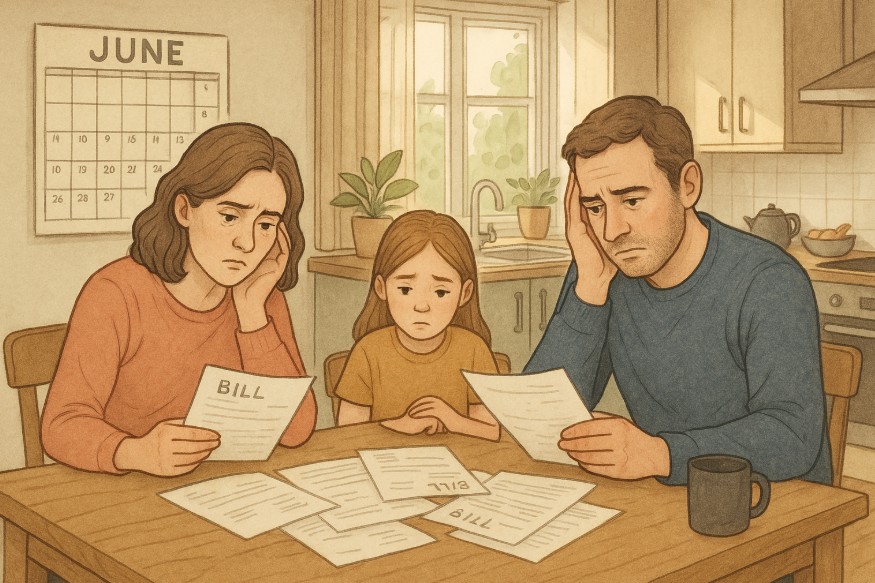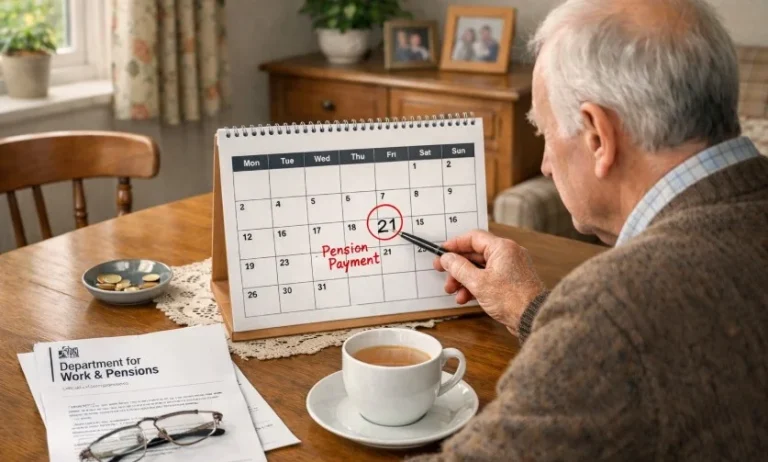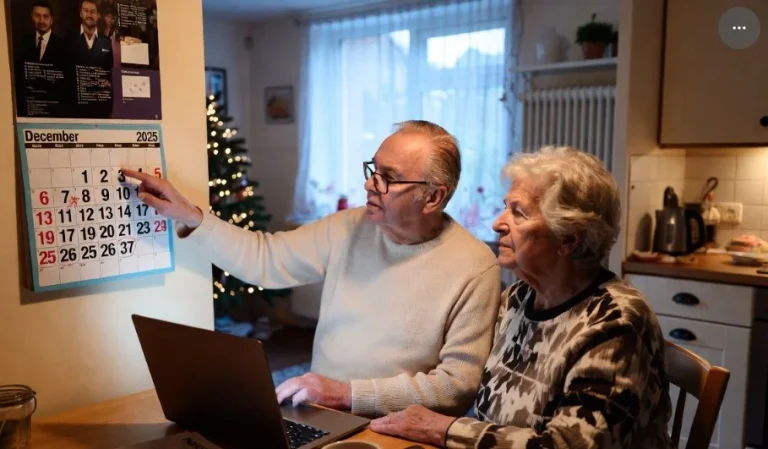The rising cost of living continues to place pressure on households across the UK. To alleviate financial strain, the government has provided various forms of support through cost of living payments and welfare schemes.
As of June 2025, one of the most anticipated supports is the reopening of the Household Support Fund. Many are asking: is there a cost of living payment in June? This article provides a comprehensive look at the available assistance, eligibility criteria, and how to apply.
What is the June 2025 Cost of Living Payment?
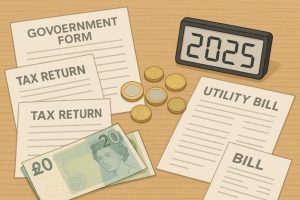
The June 2025 cost of living support will be delivered through the Household Support Fund (HSF), which is a targeted financial relief programme run by local councils.
Unlike previous direct payments from the Department for Work and Pensions (DWP), this support is discretionary and not distributed nationally as a single lump sum.
The Household Support Fund is aimed at assisting low-income individuals and households who are unable to meet essential living costs. Councils are given flexibility to design their own programmes and allocate funds based on local needs.
The fund is part of the broader government strategy to provide emergency financial relief to vulnerable groups, especially during periods of inflation or seasonal expenses.
Applications for the latest round of this scheme will reopen from 1 June 2025, making it possible for eligible households to request assistance.
Who Is Eligible for the June Cost of Living Payment?
Eligibility criteria vary by council, but most follow a general framework to identify those in need. Local authorities typically consider the following groups as priorities:
- Low-income families
- Pensioners on limited fixed incomes
- Disabled individuals with additional expenses
- Households receiving Universal Credit or other means-tested benefits
- People who are not on benefits but can prove hardship
Applicants will generally need to provide documentation that supports their claim of financial need, such as proof of income, benefit entitlement, utility bills, or a letter of hardship from a recognised agency or charity.
It’s also important to note that households who have already received support through the HSF in the past 12 months may not be eligible to apply again during this cycle.
How Can You Apply for the June 2025 Household Support Fund?
Each local authority manages its own application process. However, the general steps for applying remain consistent across most regions:
- Visit your local council’s website and locate their “Household Support Fund” page.
- Complete an online form or download a printable version.
- Submit proof of hardship, such as payslips, utility bills, or bank statements.
- Await a decision, which typically takes between 2 to 4 weeks.
Some councils also work with voluntary sector partners to distribute these funds. For example, Birmingham Voluntary Services Council (BVSC) is the delivery partner for Birmingham City Council and handles enquiries and distribution for applicants within the city.
What Expenses Does the Household Support Fund Cover?
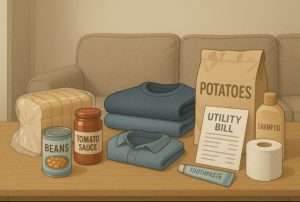
The Household Support Fund is designed to help with day-to-day living expenses that are essential for basic welfare. Councils may tailor their assistance programmes to reflect the specific needs of their community, but typical covered expenses include:
- Food and groceries for individuals and families
- Gas, electricity, and water bills
- Clothing, toiletries, and hygiene products
- Bedding and small home essentials
- White goods such as fridges, cookers, or washing machines in urgent situations
Some councils also provide food vouchers to eligible families during school holidays, ensuring children continue to receive adequate nutrition outside of term time.
How Much Can You Receive from the June 2025 Support?
The amount granted under the Household Support Fund differs based on household needs, council funding levels, and available resources. Typically, payments or vouchers range between £100 and £200, but this can vary widely by location.
Here is a sample breakdown of grant amounts and what they generally cover:
| Type of Expense | Typical Grant Amount | Notes |
| Food and groceries | £50 – £100 | Issued as supermarket vouchers or e-vouchers |
| Utility bill assistance | £100 – £150 | Credited directly to utility providers |
| Essential home items | £100 – £200 | Based on item cost and household size |
| School holiday food support | £15 – £30 per child | Distributed as vouchers during holiday weeks |
When Will You Receive the June Cost of Living Payment?
The timeline for receiving support depends on the specific council’s review and processing capacity. On average, applicants can expect:
- Acknowledgement of application within 5 working days
- Application review within 10 to 20 working days
- Payment or voucher distribution by the end of June if applied early
Local authorities generally advise applicants to apply early in June, as funds are limited and applications are often reviewed on a rolling basis until the allocation is exhausted.
What Happens If You Already Received Help in the Past 12 Months?
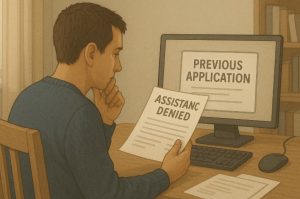
A key eligibility criterion for this round of funding is the 12-month exclusion period for those who have already received assistance. This means that if your household benefited from the Household Support Fund in or after June 2024, you may not be eligible for this new round in June 2025.
However, households that received a grant before June 2024 and are not currently on a waiting list will likely be allowed to apply again. Councils like Birmingham have already clarified this in their public announcements, ensuring applicants are aware of when they can submit a new enquiry.
This rule ensures equitable access to limited public funds and prioritises households that have not previously received aid through the scheme.
What Other Government Financial Support Is Available in the UK?
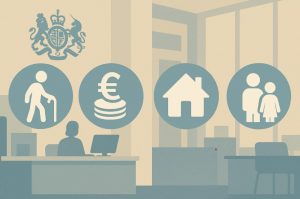
While the Household Support Fund (HSF) provides a valuable source of localised help, it is just one of several support mechanisms available to individuals and families across the UK.
The UK government offers a range of financial assistance schemes to help people manage the increasing cost of living, especially those with low incomes, disabilities, or specific vulnerabilities.
These schemes are often means-tested, requiring applicants to meet income and savings thresholds, but others are available to a wider portion of the population based on circumstance rather than income.
Here are the most relevant national support schemes:
Universal Credit
Universal Credit is a monthly payment for people on low income or who are out of work. It replaces six older benefits, including Income Support, Jobseeker’s Allowance (JSA), and Housing Benefit.
Key features include:
- Payment frequency: Monthly or twice-monthly in Scotland
- Includes housing support, child elements, and disability allowances
- Eligibility is assessed based on income, savings, and family size
This benefit is often the first point of access for additional entitlements such as free school meals, Warm Home Discount, and free prescriptions.
Pension Credit
Pension Credit provides extra income to people over State Pension age who have a low retirement income. It is often underclaimed, yet it opens the door to several other benefits.
There are two types:
- Guarantee Credit: Tops up weekly income to a minimum level
- Savings Credit: For people with some savings or a small pension (only available if reached State Pension age before April 2016)
Receiving Pension Credit may also entitle pensioners to:
- Free TV licences (for those aged 75+)
- Help with NHS dental treatment, glasses, and travel
- Council Tax Reduction
Council Tax Reduction (CTR)
Most local authorities offer Council Tax Reduction schemes to assist residents who are on low income or claiming benefits. This reduction can lower the council tax bill significantly or eliminate it altogether, depending on the household’s financial situation.
Factors affecting eligibility include:
- Household income and savings
- Number of dependants
- Residency status and council-specific rules
This is not an automatic discount applicants must apply through their local council.
Discretionary Housing Payments (DHPs)
Discretionary Housing Payments are top-up funds available to those receiving Housing Benefit or the housing element of Universal Credit, but still struggling with rent or housing costs.
They are awarded by local councils and are intended to cover:
- Rent shortfalls due to the benefit cap or bedroom tax
- Deposits or advance rent needed for a new home
- Moving costs and temporary housing support
DHPs are temporary and meant to bridge financial gaps during housing transitions or unexpected costs.
Child Benefit
While not means-tested, Child Benefit is a regular payment made to parents or guardians to help with the cost of raising children. The standard rate is:
- £25.60 per week for the eldest or only child
- £16.95 per week for each additional child
Those earning more than £50,000 per year may have to repay some or all of it through the High Income Child Benefit Charge, but lower-earning households benefit fully.
Warm Home Discount Scheme
The Warm Home Discount is a seasonal rebate of £150 applied directly to the electricity bill of qualifying households. The scheme is available to:
- Pensioners receiving the Guarantee Credit element of Pension Credit (core group)
- Low-income households identified by energy suppliers (broader group)
Applications are made directly through participating energy suppliers, and eligibility criteria can vary.
Cold Weather Payments and Winter Fuel Payments
Two separate schemes provide additional heating support:
- Cold Weather Payment: £25 for each 7-day period of very cold weather (0°C or below), for those on certain benefits
- Winter Fuel Payment: Annual tax-free payment of £250–£600 for pensioner households
Both schemes help with rising energy bills during the winter months and are issued automatically to eligible claimants.
Local Welfare Assistance Schemes
Beyond national schemes, many councils run their own Local Welfare Assistance Programmes (LWAPs). These are intended to cover:
- Crisis support (e.g. emergency food, fuel vouchers)
- Household items like beds, white goods, and furniture
- Temporary accommodation and transport
These schemes differ in scope and funding depending on the local authority but often work in conjunction with food banks and community partners.
Conclusion
While there is no universal cost of living payment in June 2025 from the DWP, targeted support will be available through the Household Support Fund. Local councils across the UK will open applications to assist low-income and vulnerable residents with essential costs. Those facing financial hardship are strongly encouraged to check their council’s website from 1 June and submit applications promptly, as funding is limited and demand is expected to be high.
FAQs About June 2025 Cost of Living Payments
How do I know if my local council is offering cost of living payments?
Visit your local authority’s website or contact their welfare support team directly to see if they are participating in the June 2025 Household Support Fund.
Can I apply for Household Support Fund if I’m not on benefits?
Yes, many councils allow applications from households not receiving benefits, as long as you can demonstrate financial hardship.
How long does it take to get support after applying?
Processing usually takes 2–4 weeks, though it may vary based on your council’s resources and demand.
What if my application is rejected?
You may be able to appeal or reapply later if funding remains. Check with your local council for their policy on rejected applications.
Are there any age restrictions to apply for the fund?
No specific age restrictions, but you must be responsible for household expenses. Some councils may prioritise families or pensioners.
Do I need a National Insurance number to apply?
While not always required, many councils will ask for a National Insurance number or other proof of identity and residency.
Can self-employed people apply for cost of living help?
Yes, self-employed individuals experiencing hardship may apply if they meet the council’s eligibility criteria.

